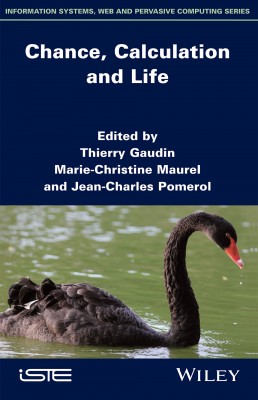
Chance, Calculation and Life brings together 16 original papers from the colloquium of the same name, organized by the International Cultural Center of Cerisy in 2019.
From mathematics to the humanities and biology, there are many concepts and questions related to chance. What are the different types of chance? Does chance correspond to a lack of knowledge about the causes of events, or is there a truly intrinsic and irreducible chance? Does chance preside over our decisions? Does it govern evolution? Is it at the origin of life? What part do chance and necessity play in biology?
This book answers these fundamental questions by bringing together the clear and richly documented contributions of mathematicians, physicists, biologists and philosophers who make this book an incomparable tool for work and reflection.
Part 1. Randomness in all of its Aspects
1. Classical, Quantum and Biological Randomness as Relative Unpredictability, Cristian S. Calude and Giuseppe Longo.
2. In The Name of Chance, Gilles Pagès.
3. Chance in a Few Languages, Clarisse Herrenschmidt.
4. The Collective Determinism of Quantum Randomness, François Vannucci.
5. Wave-Particle Chaos to the Stability of Living, Stéphane Douady.
6. Chance in Cosmology: Random and Turbulent Creation of Multiple Cosmos, Michel Cassé.
7. The Chance in Decision: When Neurons Flip a Coin, Mathias Pessiglione.
8. To Have a Sense of Life: A Poetic Reconnaissance, Georges Amar.
9. Divine Chance, Bertrand Vergely.
10. Chance and the Creative Process, Ivan Magrin-Chagnolleau.
Part 2. Randomness, Biology and Evolution
11. Epigenetics, DNA and Chromatin Dynamics: Where is the Chance and Where is the Necessity?, David Sitbon and Jonathan B. Weitzman.
12. When Acquired Characteristics Become Heritable: The Lesson of Genomes, Bernard Dujon.
13. The Evolutionary Trajectories of Organisms are Not Stochastic, Philippe Grandcolas.
14. Evolution in the Face of Chance, Amaury Lambert.
15. Chance, Contingency and the Origins of Life: Some Historical Issues, Antonio Lazcano.
16. Chance, Complexity and the Idea of a Universal Ethics, Jean-Paul Delahaye.
Thierry Gaudin is an engineer at MINES ParisTech and holds a doctorate in Information Sciences and Communication from Paris Nanterre University, France. He is a widely renowned expert in innovation policy and has worked with the OECD, the European Commission and the World Bank.
Marie-Christine Maurel is Professor at Sorbonne University and a researcher at the Institute of Systematics, Evolution, Biodiversity, MNHN, Paris, France.
Jean-Charles Pomerol is Professor Emeritus at Sorbonne University, France. He is a specialist in Decision Support Systems and former project leader for information technology in the Engineering Sciences Department at the CNRS. He was formerly in charge of the Artificial Intelligence laboratory at UPMC, Paris, as well as the President of UPMC between 2006 and 2011.